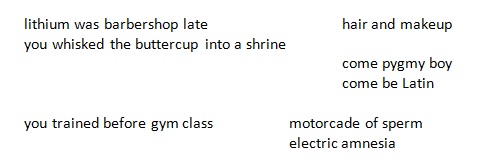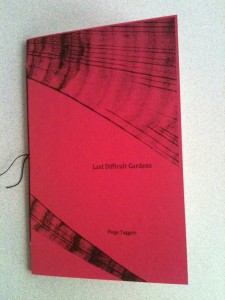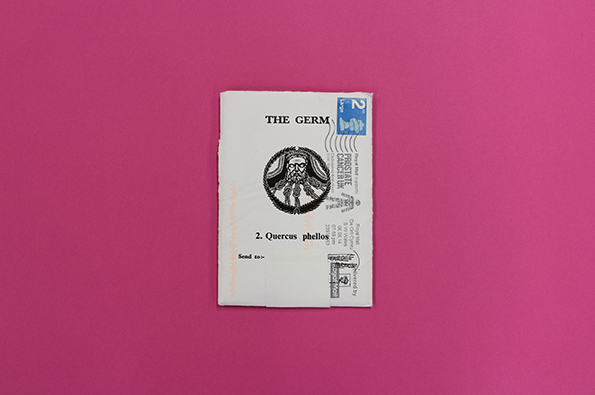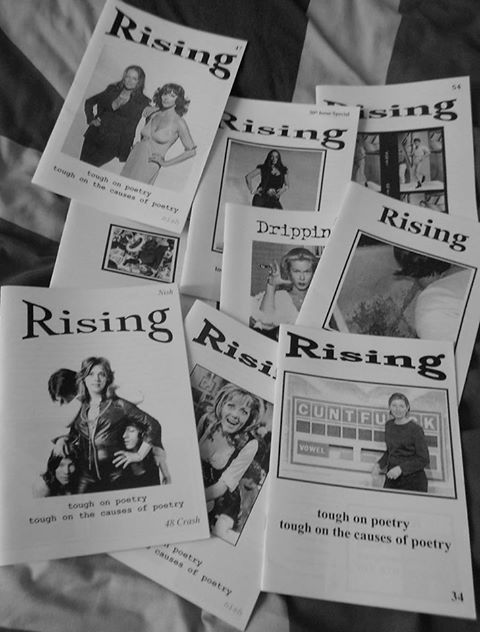Last Difficult Gardens by Paige Taggart
-Reviewed by Billy Mills–
Paige Taggart is a native of California and resident of Brooklyn. In addition to her poetry, she designs and makes jewellery which, if her website is anything to go by, is decorative, colourful and attractive. Last Difficult Gardens is a chapbook comprising a sequence of fourteen poems in what might, I suppose, be termed a post-L=A=N=G=U=A=G=E idiom that read like they were written by the jeweller’s monochrome alter ego.
Not that there’s anything intrinsically wrong with L=A=N=G=U=A=G=E or its influence; many of the very best American poets of the last half century were associated with that group. And Taggart has absorbed their technical lessons well and writes technically competent verse with a smooth surface finish. Visually, her poems are laid out carefully on the page, using space and parallel columns of text as regular organising features, but as you read the poems these techniques seem to lack either the necessary inevitably or the deliberate disruption of that inevitability required to make the poetry really interesting. The result is, for this reader at least, a kind of avant garde by numbers.
A typical enough passage reads:
clearly something is going on here, but the writing just isn’t engaging enough to make me want to work out what it might be.
In other places the undigested influence of Beckett is apparent:
and so on in a competent but ultimately pointless piece of ventriloquism.
There is an underlying toying with gender politics through many of the sections, in lines like:
This is very right on, I suppose, and I’m in sympathy with the underlying sentiment. However, once again the writing simply doesn’t sing, to my ears at least, and so it fails, for me, as poetry.
The phrase ‘word olympics’ appears in the second section of the poem, and in a curious way it sets the poem for what is to come, an approach to the writing of poetry that is coached, learned, perhaps over-trained. Somewhere along the line any idea that poetry should give pleasure, should move the reader, be it emotionally or intellectually, seems to have been discarded to make way for performance, by which I don’t mean Performance Poetry as the term is generally used, but rather performance as the display of technique for its own sake. Taggart is clearly a serious poet with definite technical ability. If she just relaxed a bit and enjoyed herself more, she might just also be a more interesting one.








A few thoughts on this review… it’s challenging for me as a reader to read the sentence “the writing just isn’t engaging enough to make we [sic] want to work out what it might be” when it’s held up against the idea that this poetry is operating as post-language poetry – a movement that, by very definition, puts the burden of comprehension on the reader. This seems quite problematic. To say that the poetry is “pointless” runs parallel to the idea that it’s operating as avant garde; I’m also not sure “avant garde” is being using correctly in that same context- it’s not an interchangeable term for “this is too boring for me to understand.”
Also problematic for me as a reader, is the term “technical ability” as I’m not sure the relation to the work; is it in the form? Are we talking about the physical syntax? The language? I think the review is confusing accessibility with technique (ala “pleasure”).
Last bit here, I believe it may help to have a better understanding of the poet’s “training” since that is brought into account. My takeaway is that she lived in California and New York and makes jewelry. Context can lend credibility (to both the poet and the reviewer). Horseless Press publishes some really great poetry, so I might be operating under the notion that there is more than meets the eye to this work than what is splayed here.
If it helps at all, I’m in favour of ‘experimental’ poetry, and indulge in it myself. The thing is that there is good experimental poetry and bad experimental poetry, and to me this book belongs in the latter camp. This is, of course, a subjective position, but any review of a book of poetry will of necessity subjective. All the reviewer can do is be honest, and this is an honest record of my subjective reading. Nobody has to agree with me, but I would ask you to accept my good faith.